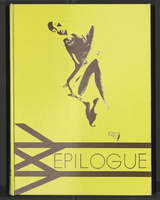Search the Special Collections and Archives Portal
Search Results

Transcript of interview with Jeanne P. Chretien by Cynthia L. Reeves, February 26, 1979
Date
Archival Collection
Description
On February 26, 1979, Cynthia L. Reeves interviewed Jeanne P. Chretien (born 1923 in Marshalltown, Iowa) about her life in Southern Nevada. Chretien first talks about her move to Las Vegas and her beginning education, including how the educational system has changed over time. She also describes her first occupations, political activity, involvement in groups such as the Girl Scouts, and early recreational activities. The two later discuss Block 16, entertainment, the atomic testing, the effects of World War II, and flooding in Las Vegas. The latter part of the interview includes topics on Chretien’s religious activity, her enrollment into Nevada Southern University, and the changes in Las Vegas over time. The interview concludes with Chretien’s thoughts on rearing children in Las Vegas as well as how she believes the city will continue to grow in the future.
Text

Transcript of interview with Mary Cooke by Gigi Arino, March 18, 1978
Date
Archival Collection
Description
On March 18, 1978, Gigi Arino interviewed antique shop owner, Mary B. Cooke (born November 13th, 1936 in Watertown, Wisconsin) in her antique shop in Las Vegas, Nevada. During this interview Mary discusses previous jobs, personal family history, education, and the growth and development of the city. She also expresses her opinions on the topic of welfare, healthcare and the condition of the hospitals in Las Vegas.
Text

Wilma Cooper interview, February 27, 1977: transcript
Date
Archival Collection
Description
On February 27, 1977, collector Sara Finklea interviewed housekeeper, Wilma Cooper (born December 19th, 1913 in Rock Springs, South Wyoming) in her home in Boulder City, Nevada. This interview covers Boulder City and Henderson.
Text

Maria Paloma Galvan oral history interview: transcript
Date
Archival Collection
Description
Oral history interview with Maria Paloma Galvan conducted by Claytee D. White on October 30, 2017 for the Remembering 1 October Oral History Project. In this interview, Galvan discusses the evening of October 1 as a Lyft driver. She recalls hearing gunfire while at the Luxor Hotel and Casino driveway and driving people away from the area. Galvan describes driving a wounded man to Sunrise Hospital and the scene there. Lastly, Galvan discusses the Las Vegas community after the tragedy, and her attitude on gun laws.
Text

Michael Ciccolo oral history interview: transcript
Date
Archival Collection
Description
Oral history with Michael Ciccolo conducted by Claytee D. White on September 18, 2018 for the Remembering 1 October Oral History Project. In this interview, Ciccolo, a doctor at Sunrise Hospital in Las Vegas, Nevada, discusses the early morning after the mass shooting on October 1, 2017. He participated in surgery for two victims in the early morning after the shooting. As a doctor trained in Iowa, Arizona, and California, Ciccolo and his family love the city of Las Vegas. He trained at the University of Iowa, University of Arizona, and University of Southern California. His thoughts after the October 1 tragedy include the belief that as a society, we are not grateful enough for everyday things. He also discusses anger, and his conflicting thoughts on gun ownership.
Text

Transcript of interview with Maurice "Maury" Halfon Behar by Barbara Tabach, March 14, 2016
Date
Archival Collection
Description
In this interview, Behar reflects upon his childhood in France, and later adjusting to life in New York. He talks of his admiration for those that have cared for him in his youth, including Marie Cazous and his parents, Marco and Flora Behar. He details his career path, and how he ended up in Las Vegas. In addition, Behar describes a recent family trip to France, visiting his place of birth for the first time since leaving as a child.
Text

Transcript of interview with Otto Merida by Claytee White, May 18, 2017
Date
Archival Collection
Description
When looking back on his legacy in the Latinx community of Las Vegas, Otto Merida (1945 - ) takes great pride in being a Latin Chamber of Commerce [LCC] co-founder with Arturo Cambeiro. With the LCC, they forged a powerful economic entity that continues to provide the local Latino community with social and political influence. Growing up during the 1950s in Havana, Otto Merida fondly remembers his childhood despite living under the dictatorship of Fulgencio Batista. There were the murmuring sounds of explosions from afar on the way to baseball games, but also the warm Sunday family meals of Cuban soup with fideos. In this interview, he talks about the rising communist powers inspired by revolutionary Fidel Castro and the events that led his family to place him in the Peter Pan Program in 1961. The Peter Pan Program sent unaccompanied Cuban children to the United States to avoid potential instruction by Castro’s government. Merida still holds on to his mother’s final request upon leaving Cuba-“I want you to remember the address where we live and the phone number: Josefina 68-entre primera y segunda-La Víbora, Havana con el teléfono X4304.” As a part of the Peter Pan Program, Merida experienced a nomadic childhood living in barracks in Miami and a three-story home in Wilmington, DE. The only connection he had to his family were a series of letters he exchanged with his mother, until they reunited years later in Miami. For Merida, life on 79th Street and Biscayne Boulevard in Miami was defined by the values of his family and other Cubans and African Americans in his neighborhood. v Merida earned his bachelor’s degree in Political Science from the University of Florida. He credits his sister-in-law with a pivotal role in his decision to pursue a higher education. His engagement in politics continued through his involvement with the Cuban Circle, the first Hispanic community to be involved with politics in Las Vegas. He describes the migration of Cubans to the casino scene of Las Vegas and the presence of Cubans in the community. His work with the Cuban Circle inspired him to develop a political presence for Hispanics in the community. While travelling across the United States before settling in Las Vegas, Merida made many significant relationships while working with associations such as the Fitchburg Chamber of Commerce and Volunteers in Service to America [VISTA]. Living in Las Vegas, Otto Merida worked as an educator and community organizer. In the late 1970s, Merida and Arturo Cambeiro collaborated to create the Latin Chamber of Commerce of Las Vegas. For Merida, the Chamber consistently goes above and beyond the vision he and Cambeiro had created when they first opened their doors. From the creation of the Latino Youth Leadership Program at UNLV to their work alongside political figures such as Senator Catherine Cortez-Masto, Merida is extremely proud of the various accomplishments of the Chamber. Now as President Emeritus, Otto Merida continues to dedicate himself to the Chamber as a volunteer and serves as one of the many Latinx Voices of Southern Nevada that have shaped the greater Las Vegas community.
Text

Epilogue: UNLV Yearbook, 1972
Date
Description
Yearbook main highlights: schools and departments; detailed lists with names and headshots of faculty, administration and students; variety of photos from activities, festivals, campus life, and buildings; campus organizations such as sororities, fraternities and councils; beauty contest winners; college sports and featured athletes; and printed advertisements of local businesses; Institution name: University of Nevada, Las Vegas
Mixed Content

Interview with Corbin Harney, August 4, 2005
Date
Archival Collection
Description
Text

Transcript of interview with Susan Jones Watson by Claytee White, February 20, 2013
Date
Archival Collection
Description
A resident of Southern Nevada from the age of three, Susan Watson shares her memories of growing up and living in Las Vegas. After a year in Boulder City, Susan's father bought an old army barrack and converted it to a home in North Las Vegas; Susan remembers playing in the desert with her siblings and attending elementary and middle school before starting at Rancho High. Watching her mother design costumes for Strip performers and beautiful dresses for her own high school dances no doubt helped Susan develop her own sense of taste and style - something that she would put to good use over many years as an interior designer. Before that though, Susan shares her memories of what life was like in the Las Vegas of the 1950s and 1960s: cruising Fremont Street; movie nights; after-school work; favorite teachers; lunches on the lawn; and dance club. All combine to paint a vivid picture of a smaller town and a simpler time in the Las Vegas valley.
Text
